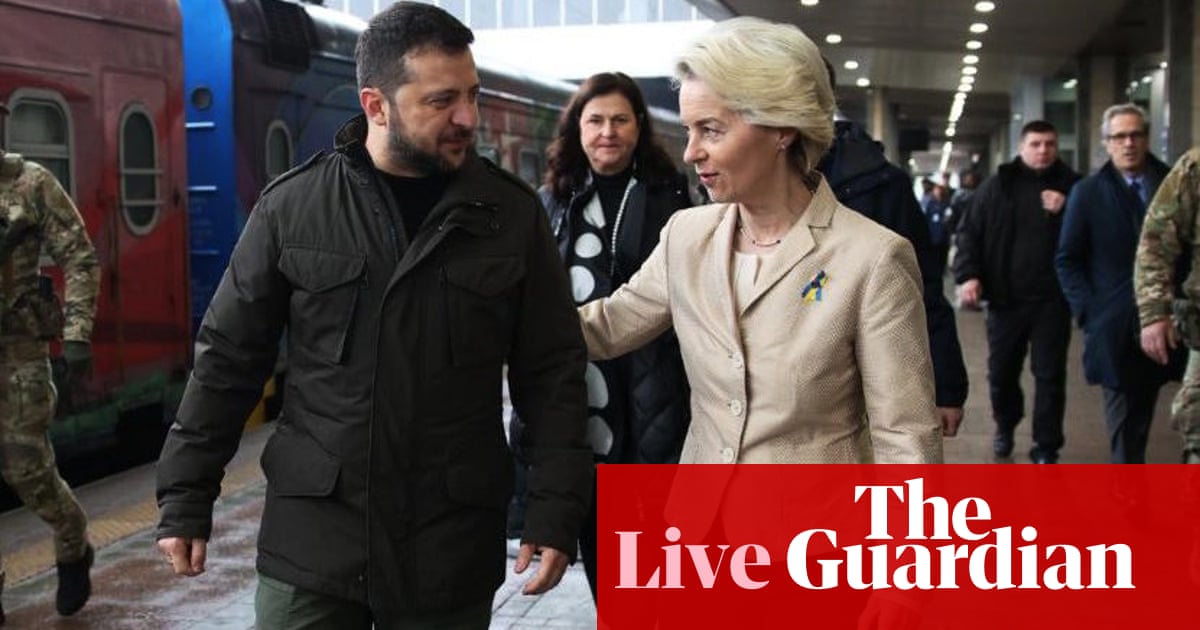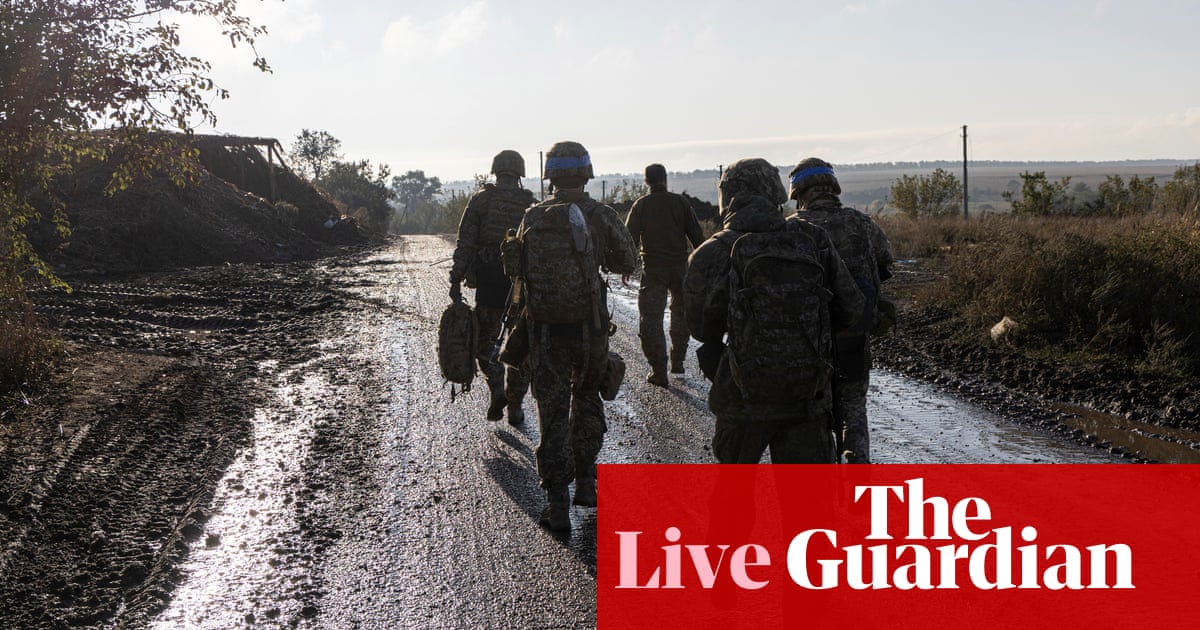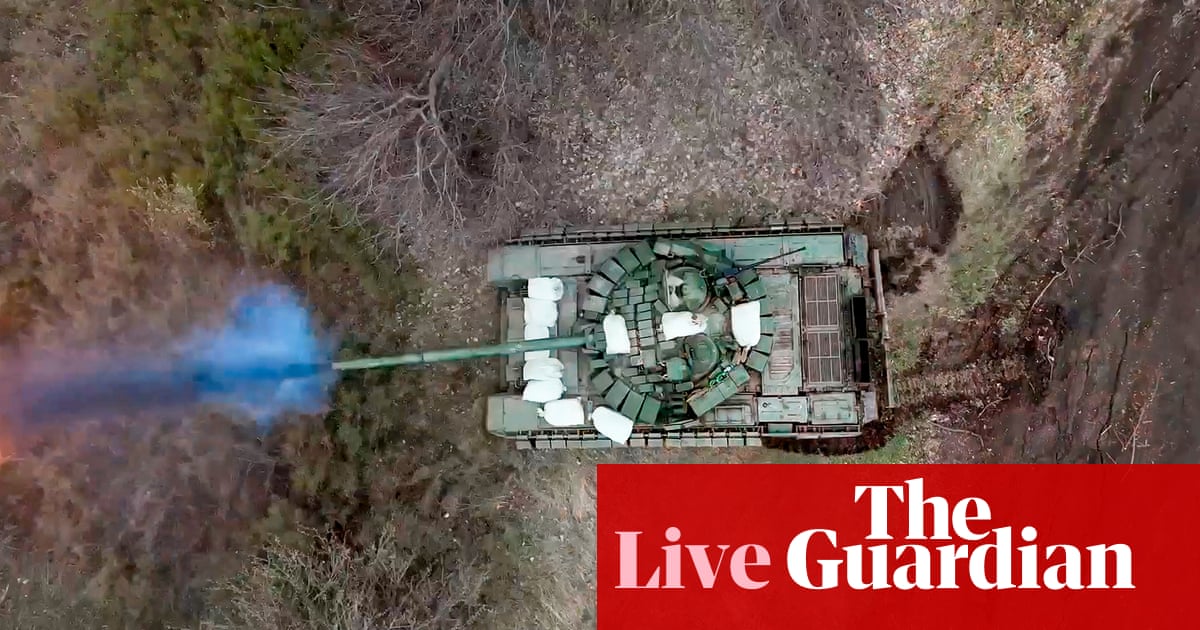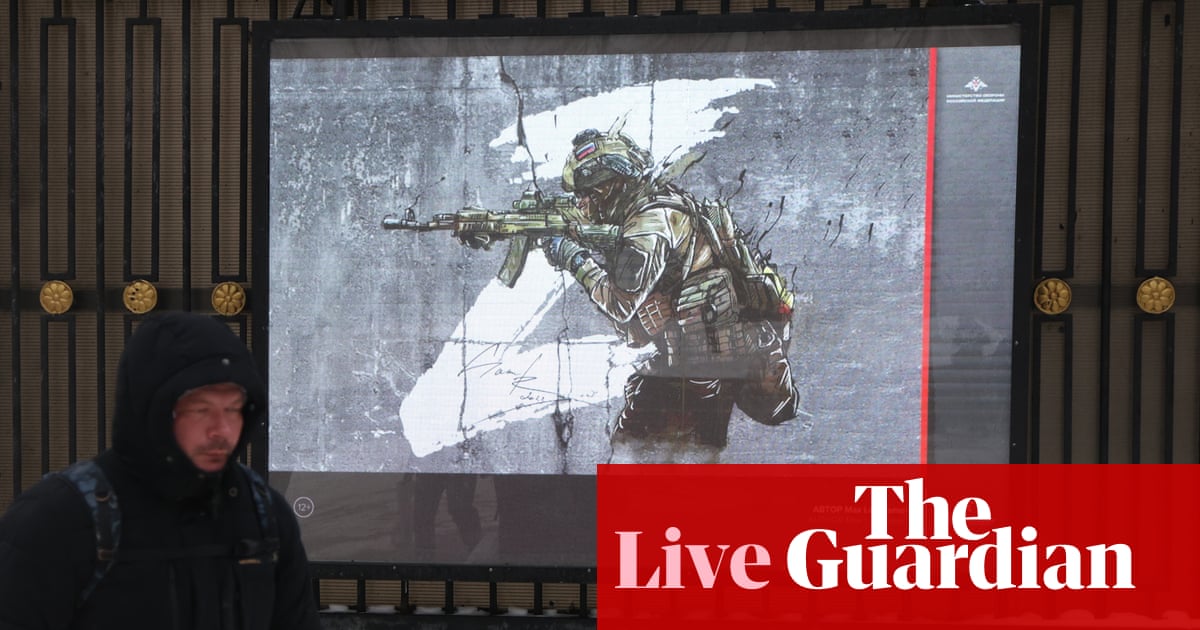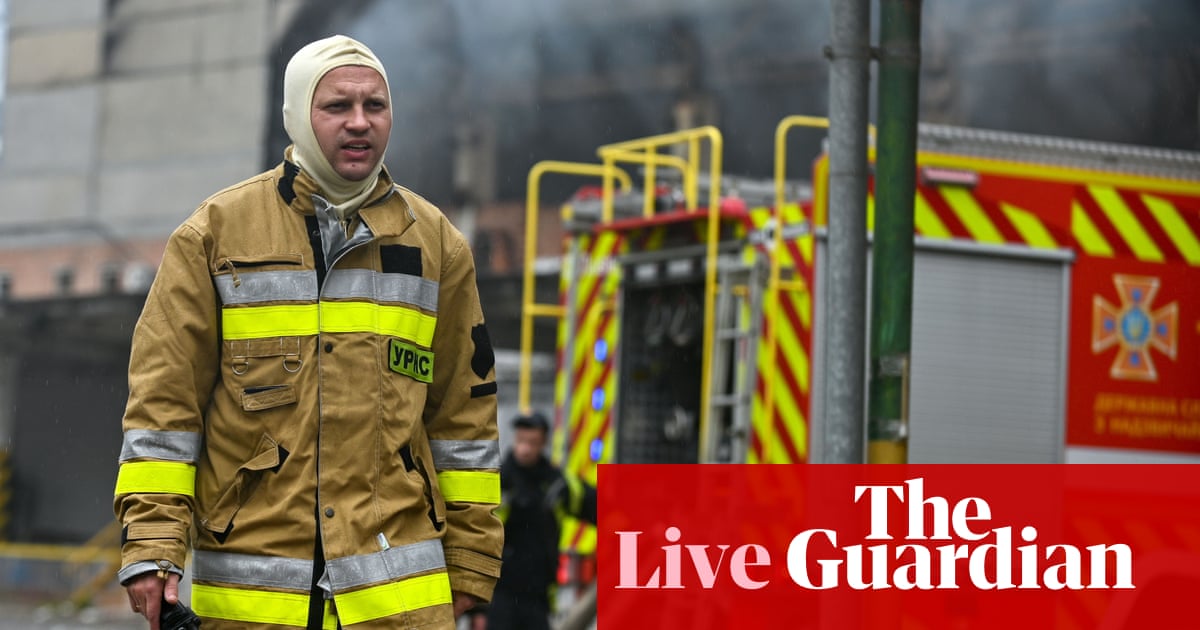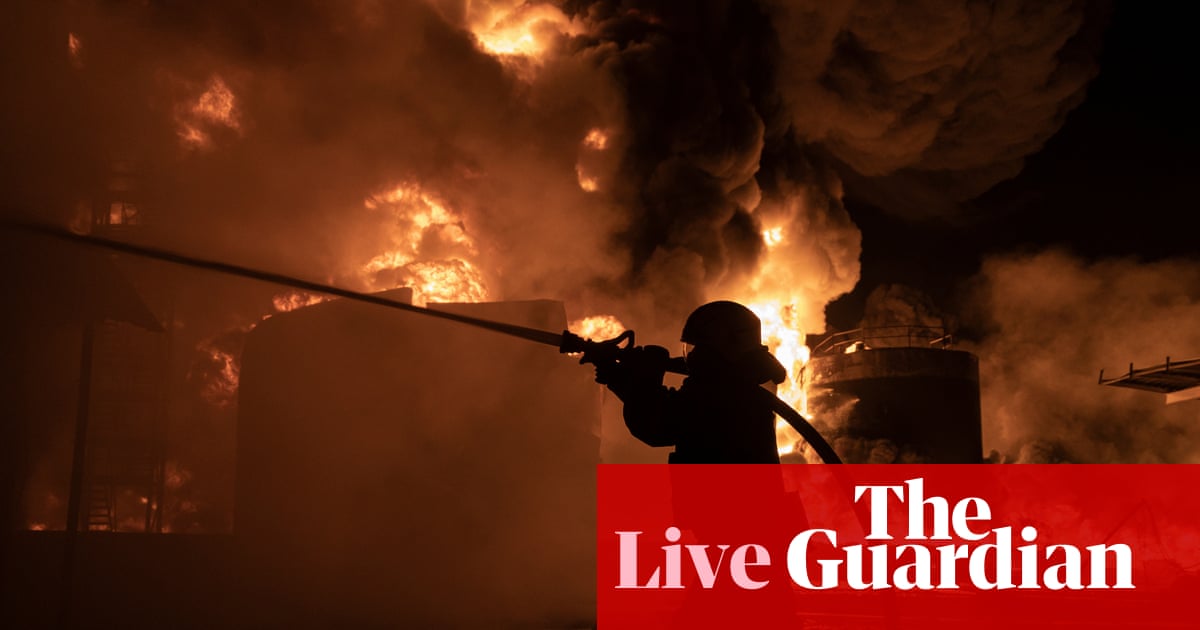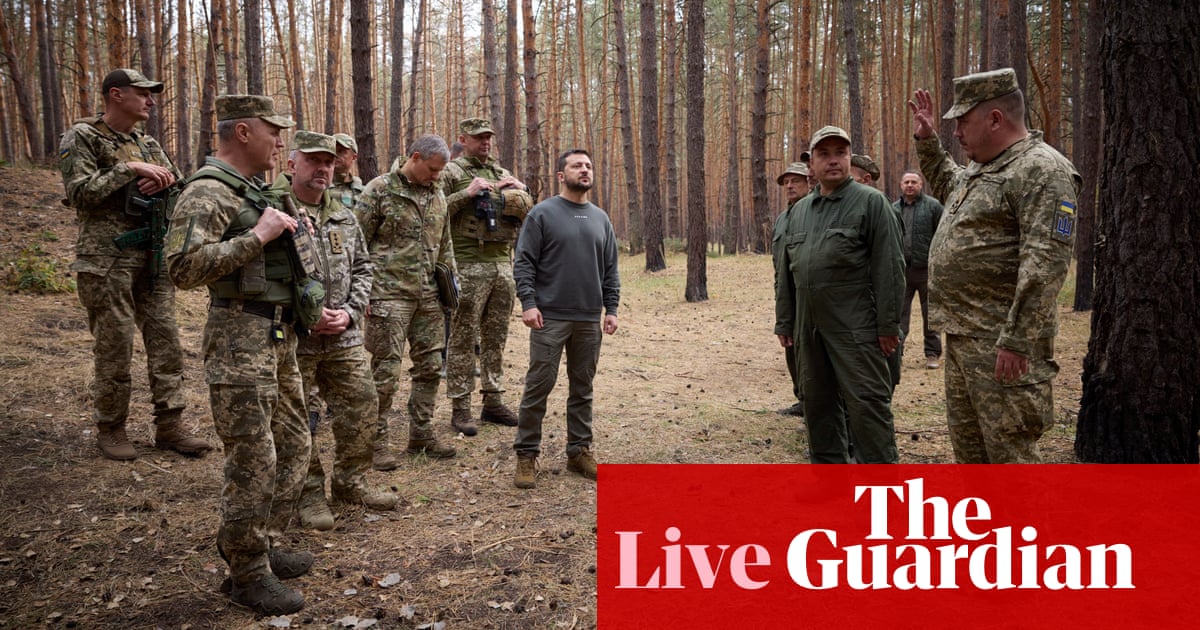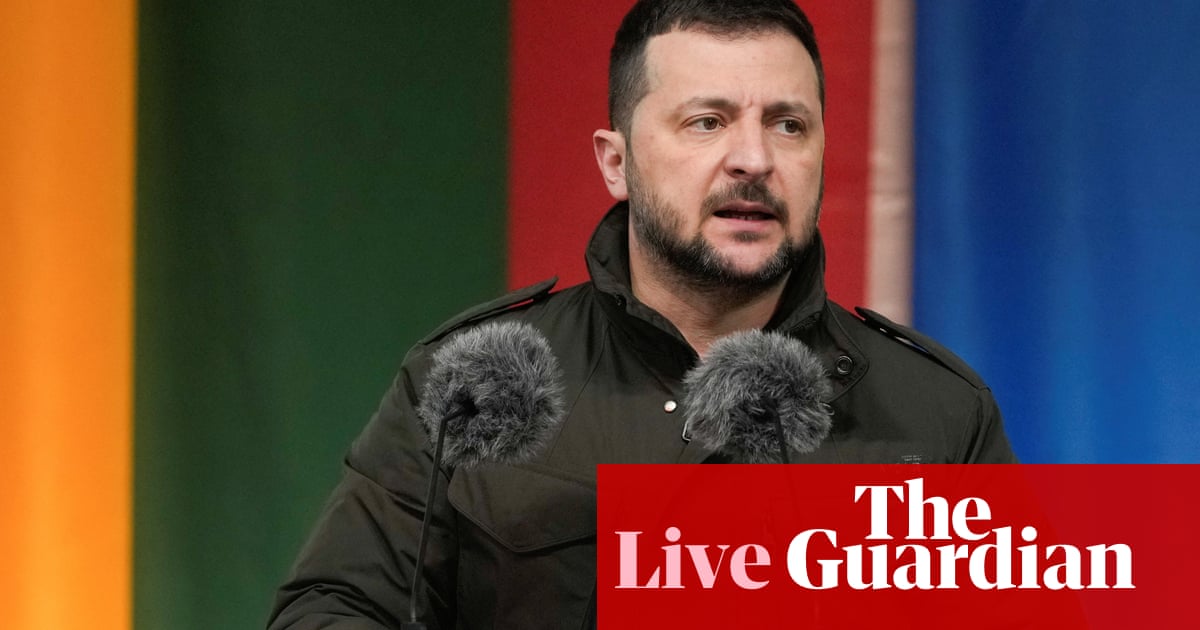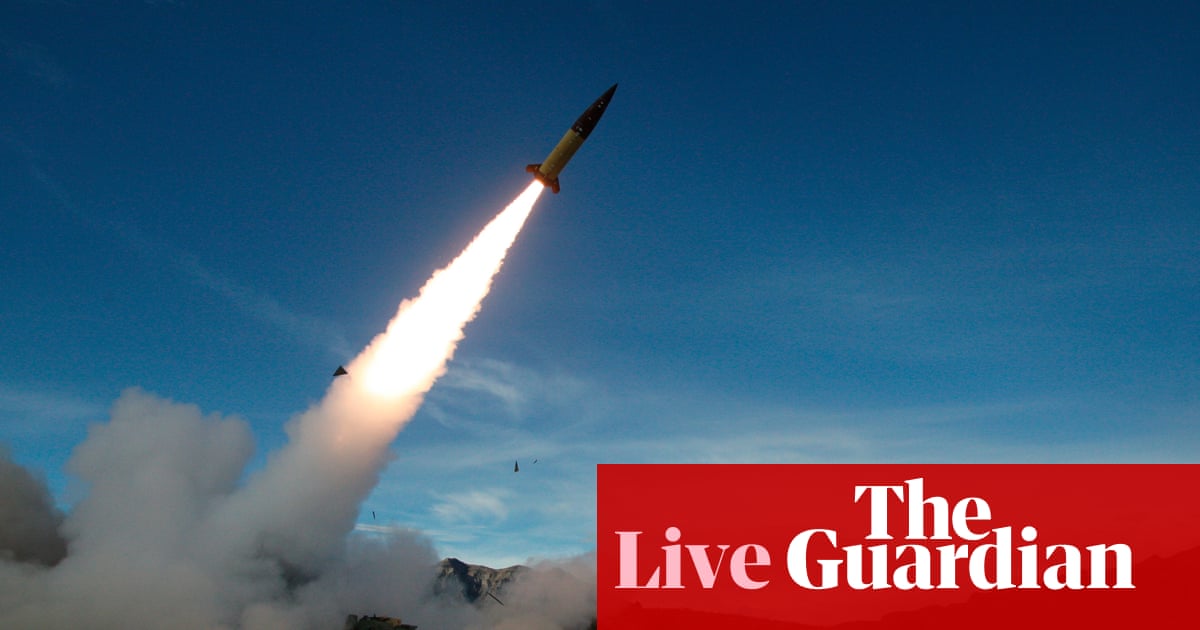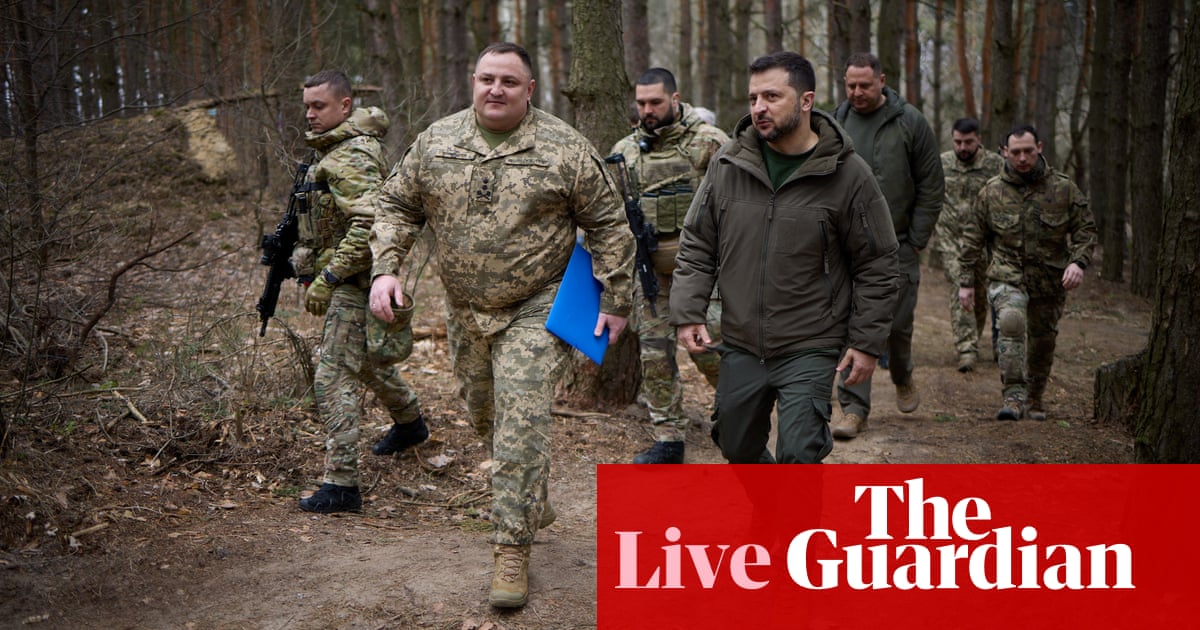
Volodymyr Zelenskiy discusses drone production with military and government officials
President Volodymyr Zelenskiy tweeted on X that he met with military and government officials to discuss drone production plans and a project to build an integrated electronic warfare control system, to protect Ukraine and its soldiers from Russian attacks.
Closing summary
It is coming up to 4pm in Kyiv and in Moscow and our blog is closing shortly. Here is a summary of today’s events:
Iran tipped off Russia about the possibility of a major “terrorist operation” on its soil ahead of the concert hall massacre near Moscow last month. Three sources have told Reuters that Iran – a diplomatic ally – shared intelligence with Russia about the upcoming attack.
Russia has attacked the town of Vovchansk in Kharkiv oblast, injuring a 27-year-old woman
Volodymyr Zelenskiy has discussed drone production and a project to build an integrated electronic warfare control system with military and government officials.
A Russian court on Monday extended the pre-trial detention of US-Russian journalist Alsu Kurmasheva, who faces 15 years in prison on charges of spreading “false information,” according to her employer. In 2022, Kurmasheva edited a book titled, “Saying No to War” – a collection of interviews and stories from Russians opposed to Moscow’s campaign against Ukraine. Her employer has called her imprisonment “outrageous” and said she had been locked up “simply because she holds an American passport.”
France’s top diplomat has said China must speak clearly to Russia over its war in Ukraine. “We expect China to send very clear messages to Russia,” said Emmanuel Macron’s foreign minister, Stéphane Séjourné, after meeting his Chinese counterpart, Wang Yi, in Beijing. “We are convinced that there will be no lasting peace if it is not negotiated with the Ukrainians. “There will be no security for Europeans if there is no peace in accordance with international law.”
Ukrainian attacks on Russian oil refineries are pushing up the cost of crude oil to near five-month highs.
Ukraine’s air force shot down two out of three Russia-launched Shahed drones on Sunday night, the Ukrainian military said on Monday. The general staff did not provide additional details.
That’s it from me, Donna Ferguson, and the Ukraine blog. Thanks for following along.
President Zelenskiy has been handing out ‘Golden Star Orders’ – the highest military decoration in Ukraine – and Crosses of Military Merit to servicemen and families of deceased soldiers who are receiving the titles and honours poshumously.
He posted on X:
There is no state power without the personal power of its people. There is no national pride without people you can be truly proud of when they are next to you, when they are your brothers-in-arms. It is an honour for the state to have such warriors. I am grateful to each of them. I am grateful to the mothers and fathers of Ukrainian Heroes for having raised such sons. I am grateful to our people and warriors for preserving Ukraine’s independence.
A video showing Ukrainian soldiers rescuing wild animals who have lost their homes and their parents in the war has been posted on X.
It shows a soldier of the 92nd Mechanized Brigade caring for two young wild boar that he rescued from forests in the Kharkiv region after their mother and three baby siblings were killed. He named the boarlets Tisha and Tosha and has trained them to lie down on command.
Another soldier, with the call sign Sladkii, is caring for a marbled polecat (which is threatened red-listed species). He has called the polecat Soledar and has trained it to hide in his pouch at times of danger. The town Soledar in the Donetsk region and its mines were the largest salt producers in Europe before the invasion, when it became the site of fighting on the frontline. After almost a year of battles, the town and its mines are now occupied by Russian forces.
Another solider brought a wild raccoon to his unit, and named it Slavko, a popular Ukrainian name. The video shows the raccoon washing its favourite toy.
Other clips show soldiers rescuing wildlife from traps and stroking wild deer.
Russian court extends pre-trial detention of US-Russian journalist Alsu Kurmasheva
A Russian court on Monday extended the pre-trial detention of US-Russian journalist Alsu Kurmasheva, who faces 15 years in prison on charges of spreading “false information,” according to her employer.
In court in the western city of Kazan on Monday, Kurmasheva smiled but complained about the poor state of the cell where she was being held, an AFP reporter said.
A journalist at the US-funded Radio Free Europe/Radio Liberty (RFE/RL), she was arrested last year for failing to register as a “foreign agent”.
RFE/RL says she was subsequently charged with spreading false information under new censorship laws following Russia’s military offensive on Ukraine in 2022.
Her pre-trial detention has now been extended until 5 June. The hearing did not concern the substance of the case.
In 2022, Kurmasheva edited a book titled, “Saying No to War” – a collection of interviews and stories from Russians opposed to Moscow’s campaign against Ukraine.
RFE/RL on Monday called her imprisonment “outrageous” and said she had been locked up “simply because she holds an American passport.”
“The charges against Alsu are baseless. It’s not a legal process, it’s a political ploy, and Alsu and her family are unjustifiably paying a terrible price,” RFE/RL head Stephen Capus said.
“Russia must end this sham and immediately release Alsu without condition,” he added.
Kurmasheva, who lives in Prague with her husband and two children, had her US and Russian passports confiscated last June after travelling to Russia for a family emergency.
She was then arrested for failing to register as a “foreign agent” in October while awaiting the return of her passports.
That charge carries up to five years in prison while spreading “false information” has a maximum sentence of 15 years.
Rights groups have accused Russia of using oppressive legislation to target regime critics and independent journalists.
Kurmasheva is the second US journalist to be arrested in Russia since the start of Moscow’s military offensive in Ukraine. Wall Street Journal reporter Evan Gershkovich has spent more than a year in jail in Moscow on espionage charges: he too has denied the charges.
Kurmasheva’s lawyers had called for her to be released from prison and put under house arrest pending the trial.
The US state department said last year that Kurmasheva’s arrest “appears to be another case of the Russian government harassing US citizens”.
Washington has accused Moscow of arresting US citizens without evidence to swap for the release of Russians jailed abroad.
A car bomb in Russian-controlled territory in Ukraine’s eastern Lugansk region killed a Moscow-appointed government official on Monday, local authorities said.
The local branch of Russia’s Investigative Committee, which probes major crimes, said the deputy head of a state-run education agency was killed when “an unidentified device detonated in a car” on Monday afternoon, Agence France-Presse reported.
Russia’s Federal Security Service (FSB) has announced that it has arrested four alleged accomplices of the terrorist attack on the concert hall in Moscow, according to the Russian state-run media RIA Novosti.
The FSB said the four suspects, who were arrested in southern Russian republic of Dagestan, were plotting another attack in the Dagestani city of Kaspiysk, according to The Kyiv Independent.
Iran says it tipped off Russia about possibility of major "terrorist operation" ahead of concert hall attack in Moscow
Iran tipped off Russia about the possibility of a major “terrorist operation” on its soil ahead of the concert hall massacre near Moscow last month, according to a Reuters report.
On 22 March, gunmen opened fire with automatic weapons at concertgoers, killing at least 144 people.
Russia has sought to place the blame on Ukraine for the attack, even though the Islamic State militant group has claimed responsibility for it and released footage of its gunmen filming themselves in the hall as they hunted victims to kill and shot them at point-blank range.
Three sources have told Reuters that Iran – a diplomatic ally – shared intelligence with Russia about the upcoming attack.
“Days before the attack in Russia, Tehran shared information with Moscow about a possible big terrorist attack inside Russia that was acquired during interrogations of those arrested in connection with deadly bombings in Iran,” one of the sources told Reuters.
A second source, who also requested anonymity due to the sensitivity of the issue, said the information Tehran provided to Moscow about an impending attack had lacked specific details regarding timing and the exact target.
“They [the terrorists] were instructed to prepare for a significant operation in Russia … One of the terrorists [arrested in Iran] said some members of the group had already travelled to Russia,” the second source said.
A third source, a senior security official, said: “As Iran has been a victim of terror attacks for years, Iranian authorities fulfilled their obligation to alert Moscow based on information acquired from those arrested terrorists.”
Asked about the Reuters report, Kremlin spokesperson Dmitry Peskov said on Monday: “I do not know anything about this.”
The US had also warned Russia about a likely militant Islamist attack, based on interceptions of “chatter” among Islamic State militants.
According to Reuters, Moscow as “deeply distrustful” of the intentions of the US state officials, and so played down the intelligence.
Iran’s foreign ministry did not reply to a Reuters request for comment on the story and The White House offered no comment on it.
Russia has attacked the town of Vovchansk in Kharkiv Oblast, injuring a 27-year-old woman, according to The Kyiv Independent.
Volodymyr Zelenskiy discusses drone production with military and government officials
President Volodymyr Zelenskiy tweeted on X that he met with military and government officials to discuss drone production plans and a project to build an integrated electronic warfare control system, to protect Ukraine and its soldiers from Russian attacks.
Japan gives Ukraine"s ministry of finance £93m grand for healthcare and housing
Japan has given Ukraine’s ministry of finance a $118m [£93m] grant for healthcare and housing projects under the World Bank’s HEAL and HOPE initiatives.
The funding will expand the range of healthcare services and improve access to medical care, while also rebuilding the housing infrastructure of Ukraine.
The grant consists of:
$70m [£55m] as part of the HEAL Ukraine project of the World Bank, aimed at supporting the state budget with medical expenses.
$48m [£38m] as part of the World Bank project “Housing Repair to Restore People’s Rights and Opportunities” (HOPE). Funds will be to reimburse the Ukrainian state for compensatory payments to apartment owners for repairs.
Foreign fighters detained yesterday in Dagestan had been involved in financing the Moscow concert hall attack, the TASS news agency cited Russia’s FSB state security service as saying today, Reuters reported.
Mykhailo Podolyak, an adviser to the head of Ukraine’s presidential office, has insisted today that there must be “no illusions.”
“It will not be possible to just sit and wait; it will still be necessary to dramatically expand military production and saturate Ukraine with a parity amount of weapons. The faster, the more effective and the better the situation will look,” he wrote.
Ten days ago, Kharkiv in northeast Ukraine lost all its power after Russia attacked the city’s energy system with a targeted missile strike.
On Saturday, the Ukrainian energy company Centrenergo said the Zmiiv thermal power plant, one of the largest in the Kharkiv region, had been completely destroyed.
Since the attack, blackout periods have been introduced to ration energy usage, as strikes continue targeting energy usage across the country. It is estimated 700,000 people lost electricity after the plant was hit, and about 120,000 people in the region are still being affected by power cuts.
Currently, the power cuts in Kharkiv last for four hours and the city’s mayor, Igor Terekhov, has said it will take weeks to restore full supply – and that is banking on the hope that Russia’s armed forces will not strike the same targets again.
“The damage is very serious,” he told the BBC. “We need time to repair it.”
The BBC has been interviewing people in Kharkiv about the impact of the missile strike on their lives.
The owner of a hair salon, identified only as Natalia, told reporter Sarah Rainsford: “It’s really hard, especially because we’re all women and when we finish work late at night it’s so dark.”
She uses a generator to keep her business operating even when power is cut.
Another resident of the city said the timings of the power cuts can slip: “They were supposed to cut the power to my area at 09:00, so I got up especially early to charge everything. Then I got in the lift and got stuck. They’d cut the power early!”
A student called Liza was concerned about Russian’s military arsenal: “People are depressed and thinking about leaving Kharkiv for a while. We notice that our army is struggling.”
But the salon owner Natalia was more upbeat. “We are invincible,” she said.
Russia has used five hypersonic missiles to attack Kyiv since the start of the year, says Ukraine
Russia has used five hypersonic Zircon missiles to attack Kyiv since the start of the year, the city’s military administration has said.
It has, in total, launched 180 weapons of various types, including missiles and drones, at the Ukrainian capital in the first three months of the year.
Ukrainian attacks on Russian oil refineries are pushing up the cost of crude oil, Reuters reports.
Brent crude was 25 cents, or 0.3%, higher at $87.25 a barrel this morning, after rising 2.4% last week. U.S. West Texas Intermediate crude was at $83.44 a barrel, up 27 cents, or 0.3%, after a 3.2% gain last week.
Russian Deputy prime minister Alexander Novak said on Friday that the country’s oil companies will focus on reducing output rather than exports in the second quarter in order to evenly spread production cuts with other OPEC+ members.
Drone attacks from Ukraine have knocked out several Russian refineries, which is expected to reduce Russia’s fuel exports.
“Geopolitical risks to crude and heavy feedstock supplies add to strong (second-quarter) demand fundamentals,” Energy Aspects analysts said in a note.
Almost 1m barrels a day (bpd) of Russian crude processing capacity is offline from the attacks, affecting its high-sulphur fuel oil exports which are processed at Chinese and Indian refineries, the consultancy added.
A Ukrainian sculptor who fled to the UK when his studio was destroyed has been accepted into the Royal Society of British Artists.
Alex Lidagovsky was forced to leave Kyiv with his wife, Dasha Nepochatova, and 16-year-old stepdaughter after the Russian invasion began on 24 February 2022.
Speaking to the PA news agency, the sculptor said his friends had sent him photos of his bombed studio. Lidagovsky, whose words were translated by his wife, said: “When we were leaving Ukraine to save our daughter, we never thought it would be for so long.
“Now, because I’m so far away from my country and it looks like I live another life, I try not to think about it, to deny it, to drive this pain into the depths of my consciousness and give myself more time to reflect on it.” Read more
Opening summary
Welcome to our live coverage on Ukraine. It is just after 10am in Kyiv and in Moscow and I’m Donna Ferguson. Here are the headlines:
France’s top diplomat has said China must speak clearly to Russia over its war in Ukraine. “We expect China to send very clear messages to Russia,” said Emmanuel Macron’s foreign minister, Stéphane Séjourné, after meeting his Chinese counterpart, Wang Yi, in Beijing. “We are convinced that there will be no lasting peace if it is not negotiated with the Ukrainians. “There will be no security for Europeans if there is no peace in accordance with international law.”
Ukraine’s air force shot down two out of three Russia-launched Shahed drones on Sunday night, the Ukrainian military said on Monday. The general staff did not provide additional details.
Russian attacks killed at least three people in different regions of eastern Ukraine, local officials said on Sunday, and two more in Lviv region, far from the frontlines. In the centre of the north-eastern city of Kharkiv, a frequent target of Russia’s attacks on energy and other infrastructure, a strike hit civilian targets in the evening, said the regional governor, Oleh Synehubov. Regional news outlets said bombs were dropped on different areas of the region. No injuries were reported. Earlier on Sunday, heavy shelling killed a man in the town of Borova, south-east of Kharkiv, local prosecutors said.
Police in the Donetsk region, in Ukraine’s south-east, said Russian shelling hit 14 towns and villages, with two dead reported in Krasnohorivka, west of the Russian-held regional centre of Donetsk.
Russian attacks on infrastructure extended well behind the frontlines. The Lviv regional governor, Maksym Kozitskyi, said two bodies were pulled from rubble after cruise missile strikes.
Russian forces bombed the border territories and settlements of the Sumy region 39 times on Sunday, the Ukrainian local regional military administration said. There were 157 explosions recorded from ordnance including artillery shells, mortars, exploding drones, drone-dropped mines and grenades, and rockets fired from helicopters. Sumy has been pounded by Russian attacks in recent weeks, forcing evacuations.
Over the border in Russia’s Belgorod region, the regional governor, Vyacheslav Gladkov, said a woman was killed when a border village came under attack. The accounts of military action from either side were not independently confirmed.
“Our spirit does not give up,” Ukraine’s president, Volodymyr Zelenskiy, said in an Easter message. “There is no night or day when Russian terror does not try to break our lives,” Zelenskiy wrote to Ukrainians on social media, following Russian missile strikes.
Zelenskiy was in Bucha on Sunday alongside the prime minister, Denys Shmyhal, and several foreign ambassadors to mark two years since the city and surrounding areas’ were liberated from a brutal month-long occupation by Russia at the start of the war. The Ukrainian leader laid a lamp at the town’s wall of remembrance, which names the 509 civilians who have so far been identified of those killed during Bucha’s occupation.
France will deliver hundreds of old armoured vehicles and new surface-to-air missiles to Ukraine. The French defence minister, Sebastien Lecornu, told a French newspaper that the president, Emmanuel Macron, had asked him to prepare a new aid package, which will include old but still functional equipment, as well as new missiles.
Protesters in Kyiv have demonstrated for the release of Ukrainian prisoners of war from the Azov brigade. Relatives and friends of captured soldiers, some dressed in military clothing, waved placards at passing traffic.




